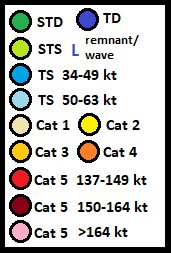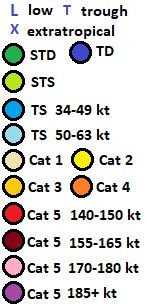Predictions for year 2020 - mainly for entertainment purposes
Totals for Atlantic hurricane season: 21 (sub)tropical cyclones, 19 nameable storms, 9 hurricanes, 6 major (ACE=171)
Totals for East Pacific hurricane season: 20 (sub)tropical cyclones, 19 nameable storms, 11 hurricanes, 6 major
Totals for Central Pacific hurricane season: 3 nameable storms, 2 hurricanes, 0 major
Totals for Pacific typhoon season: 22 storms, 10 typhoons, 5 super typhoons (JTWC count)
Totals for North Indian Ocean cyclone season: 4 storms, 3 hurricane-equivalent, 2 major hurricane-equivalent (JTWC count)
Two medicanes, neither of which is not of hurricane intensity
State of Niño 3.4: Cool neutral beginning in NDJ 2019-20, warm neutral beginning in SON 2020, weak El Niño beginning in NDJ 2020-21.
Sea surface temperatures: Subtropical Atlantic centered near 30N 60W will have a cool anomaly, more pronounced towards end of the season. Gulf Stream somewhat above average. A warm anomaly in Macaronesian waters late in the season. MDR near 60W will have SSTs about a degree Celsius above average throughout peak season. Easternmost tropical Atlantic begins with cool anomaly, but goes to 1-2 degrees Celsius above average in October. Waters near Revillagigedo Islands and west of Baja California warm up anomalously throughout the peak season, and by October, warm anomalies of 2-5 degrees Celsius will be present in much of those areas.
Arctic sea ice extent minimum: 4.05 million km²
Global annual average temperature: 0.93 degrees Celsius above 20th century average (0.01 degrees below the record from 2016)
Totals for East Pacific hurricane season: 20 (sub)tropical cyclones, 19 nameable storms, 11 hurricanes, 6 major
Totals for Central Pacific hurricane season: 3 nameable storms, 2 hurricanes, 0 major
Totals for Pacific typhoon season: 22 storms, 10 typhoons, 5 super typhoons (JTWC count)
Totals for North Indian Ocean cyclone season: 4 storms, 3 hurricane-equivalent, 2 major hurricane-equivalent (JTWC count)
Two medicanes, neither of which is not of hurricane intensity
State of Niño 3.4: Cool neutral beginning in NDJ 2019-20, warm neutral beginning in SON 2020, weak El Niño beginning in NDJ 2020-21.
Sea surface temperatures: Subtropical Atlantic centered near 30N 60W will have a cool anomaly, more pronounced towards end of the season. Gulf Stream somewhat above average. A warm anomaly in Macaronesian waters late in the season. MDR near 60W will have SSTs about a degree Celsius above average throughout peak season. Easternmost tropical Atlantic begins with cool anomaly, but goes to 1-2 degrees Celsius above average in October. Waters near Revillagigedo Islands and west of Baja California warm up anomalously throughout the peak season, and by October, warm anomalies of 2-5 degrees Celsius will be present in much of those areas.
Arctic sea ice extent minimum: 4.05 million km²
Global annual average temperature: 0.93 degrees Celsius above 20th century average (0.01 degrees below the record from 2016)
Circle coloration scheme
Individual storm tracks in North Atlantic
Tropical Storm BORIS
Hurricane ARTHUR
Tropical Depression THREE
Hurricane BERTHA
Tropical Storm CRISTOBAL
Tropical Storm DOLLY
Tropical Storm EDOUARD
Hurricane FAY
Tropical Storm GONZALO
Hurricane HANNA
Hurricane ISAIAS
Hurricane JOSEPHINE
Tropical Storm KYLE
Hurricane LAURA
Tropical Storm MARCO
Hurricane NANA
Tropical Storm OMAR
Tropical Depression EIGHTEEN
Subtropical Storm PAULETTE
Hurricane RENE
Tropical Storm SALLY
Individual storm tracks in East Pacific
This includes also all CPac activity, since I don't predict any storms to exist between 180W and 160W (outside EPac tracking map)
Tropical Storm AMANDA
Hurricane BORIS
Tropical Storm CRISTINA
Hurricane DOUGLAS
Tropical Storm ELIDA
Hurricane FAUSTO
Hurricane GENEVIEVE
Tropical Storm HERNAN
Tropical Depression NINE-E
Tropical Storm ISELLE
Hurricane JULIO
Hurricane KARINA
Tropical Storm LOWELL
Hurricane MARIE
Tropical Storm NORBERT
Hurricane ODALYS
Tropical Storm POLO
Hurricane RACHEL
Hurricane SIMON
Hurricane TRUDY
Conclusion
The most intense storm in 2020 Atlantic hurricane season will be Josephine, the costliest will be Nana, and the deadliest will be Rene. Bertha, Isaias, Nana and Rene will be retired.
The most intense and costliest storm in 2020 Pacific hurricane season will be Marie, while the deadliest will be Trudy. Boris, Marie and Trudy will be retired.











































Comments
Post a Comment